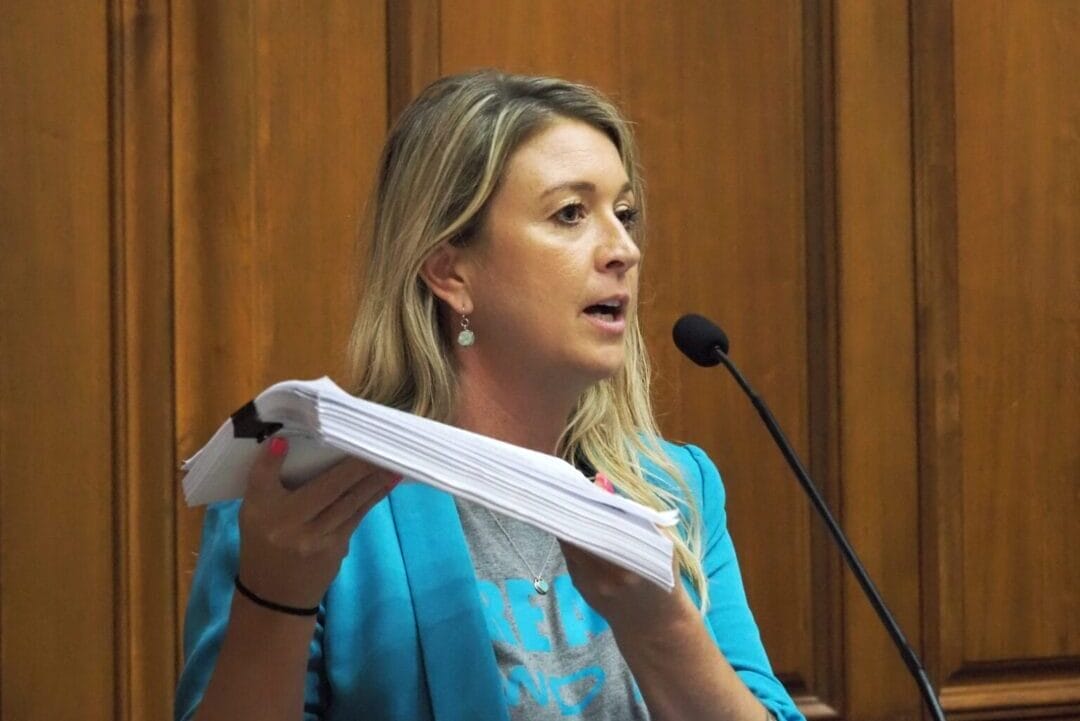Sexual assault survivors urge lawmakers to end statute of limitations, codify ‘bill of rights’
INDIANAPOLIS (INDIANA CAPITAL CHRONICLE) — Several Hoosier women on Tuesday detailed horrific cases of rape and child molestation as they asked lawmakers to take up legislation ending the statute of limitations for some sexual assault offenses.
“I deserve the right to face my perpetrators, and a jury of my peers,” Carissa Siekmann told an interim committee.
Most sex crimes have a five-year statute of limitations in Indiana. There are exceptions for newly discovered DNA evidence, a recording of the crime or a confession. Child victims have until age 31.
The limits act as deadlines for prosecutors filing criminal charges and for victims filing civil lawsuits.
Last session’s proposal nixing such limits passed the Senate unanimously, but died when it didn’t get a committee hearing in the House. That could change in the upcoming session.
Arbitrary or necessary?
For Dr. Amber Davis, the abuse began at four years old.
A family friend from church babysat her during the workweek. The upstairs bedroom, where she was supposed to nap, was a “room of torture.” Davis said her mother suspected, quit her job, and dropped the babysitter.
“My parents took me to the doctor. Back then, the exam they did was so limited; they said they didn’t find anything, and they deemed that nothing likely happened,” Davis said. “My parents never let me talk about it again.”
Years later, on her wedding night, Davis found that the abuse created so much scar tissue that she was unable to have intercourse with her husband. She required surgery, and weeks of “grueling” physical therapy.
“My first memories of sex would be of tearing flesh, pain and bleeding,” Davis told the interim panel.
Forty years later, she contended, little has improved.
Her daughter broke up with her boyfriend, and called a friend afterward to talk. Davis alleged the boy drove her daughter to a park, where he raped her.
“I took her for the rape exam, and the female officer told us that we could go ahead and pursue everything to the fullest extent,
but nothing would stick, because this young man was a football player in Carmel and he would be protected, and nothing was going to happen to him,” Davis said.
“She was right. We pursued everything … and the case just seemed to disappear,” she added.
Other witnesses noted that Indiana law upgrades sex crimes committed with deadly weapons to more severe felonies, which don’t have statutes of limitations.
“When multiple large men take turns assaulting you — using beer bottles to sodomize you while the room is filled with people videotaping you being held down — is that fear not the same?” one witness asked.
Indiana Public Defender Council attorney Joel Wieneke said statutes of limitation are intended to protect from old, fuzzy memories, discourage “malicious” prosecution and promote proactivity via timely reporting and investigations.
He expressed concern for a “slippery slope,” on which lawmakers would remove limits for other alleged crimes that are usually prosecuted “based upon the uncorroborated testimony of one witness alone.”
Courtney Curtis, an assistant executive director for the Indiana Prosecuting Attorneys Council, argued the age limit of 31 for child victims was “arbitrary.” Such limits, she asserted, say “nothing about the offender, nothing about the strength of the case — merely just what the victim was unable to do. That is unfair.”
She added that prosecutors typically have little physical evidence in child molestation cases, regardless of when they’re reported.
Senate Bill 151 would have allowed prosecution of Level 3 felony rape and child molestation offenses to start at any time. It died in the House’s Courts and Criminal Code committee.
GOP Rep. Wendy McNamara, who leads that committee and the interim panel, cited the speedy short session and some unanswered questions as reasons why she didn’t hear the bill. But on Tuesday, she said, she got one years-old question answered: the age 31 deadline comes from legislation in the 1990s.
“I’m open to anything,” she said of potential legislation.
“I really appreciate those women who spoke today and shared their horrific stories of what happened to them and their family members,” McNamara added. “And (I) hope that … we might be able to help (get) some sort of justice for them and others going that way forward.”
Witness Samantha McCoy separately advocated for lawmakers to codify a sexual assault survivor “bill of rights.”
She said she was raped in Indiana, as a junior in college, and decided to report it.
“I was taught to believe that I would be protected and that the rapist would be arrested for what he did to me, and yet I was met with hostility, mockery and a lack of trauma-informed responses,” McCoy said.
She described being interrogated for hours, forced to repeat her story of sexual assault every time a new officer entered the room. She said officers asked her to return to the crime scene for evidence, to call her rapist and record his confession, and to submit to a polygraph test. The investigation uncovered a video her assailant had recorded of the attack, but officers were skeptical she was unconscious.
“Months went by, and the only contact I received regarding my case was officers accusing me of lying,” McCoy said. She was told the case would not be prosecuted due to a lack of evidence.
“I could not understand the level of betrayal I felt by a system that I truly believed was supposed to help victims,” McCoy added. “Instead, I regretted reporting entirely.”
She pushed lawmakers to adopt more protections for rape survivors, like allowing them to obtain free and unaltered copies of law enforcement reports concerning alleged assaults.
